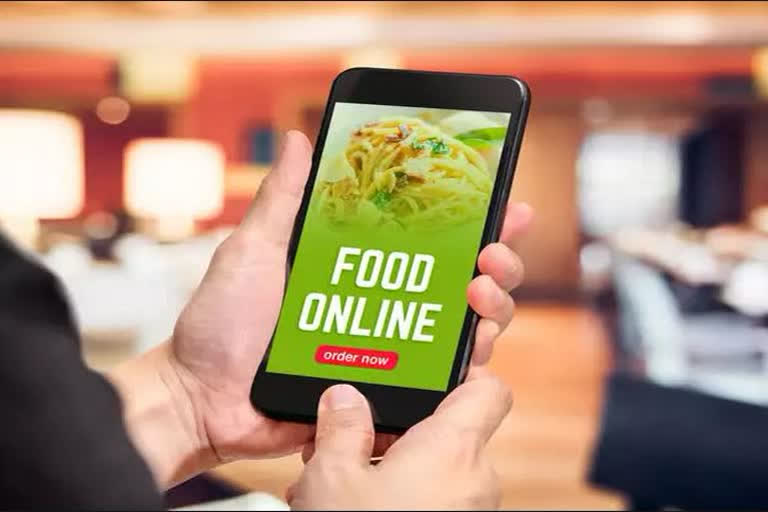Chennai: Disappointed over online food delivery companies taking the cream of profit with COVID19 pandemic seems to be leaving a permanent change in the way people eat out, Chennai restaurateurs have decided to launch their own app. They say that this change in eating habits turned out to be a boon for online food delivery companies while they are left high and dry with only paltry returns.
The eating habits of people has seen a sea of changes after COVID19 struck. For instance, a man placed his supper order as late as 4.59 am. Swiggy in its annual report 2020 has mentioned that the last of the order it received in a day was logged at 5 am for a chicken noodles. Both these orders have been placed in Chennai. The online food delivery system, which was considered a rich people affair before the pandemic, has now become part and parcel of everyone's life.
The offers provided by the online food delivery companies is another luring factor to rope middle-class people as well. The lockdown in the first and second wave has resulted in a boom of business for these companies. "Customers are now accustomed to online food delivery. They got used to ordering online without stepping out of the comfort of their houses," says Chennai Restaurateurs Association President and Proprietor of Namma Veedu Vasanth Bhavan restaurants. "Escalating fuel prices is another factor that keeps people glued to their houses. They prefer ordering online than coming out to eat," he opined.
With this change in consumption pattern, the restaurateurs are forced to rethink their business model. A kitchen with a small eating place seems to be sufficient under this new model. Considering this fact, the online food delivery companies are promoting the 'cloud kitchens' catering to online food delivery companies. Coping to this need, new parceling methods, variety of foods that could be packed into a single delivery are all evolving, the restaurateurs say. When Swiggy pitched the same idea a few years ago, it was debated whether such a business model would succeed. But the pandemic and related lockdowns are leading towards the fruition of such business models.
Read: Zomato gets Sebi nod for Rs 7,500 crore IPO
Ravi said that cloud kitchen demand has increased to three folds which is making the big restaurants nonviable. "I have a three storey building in which two are lying vacant for the last two years. A small eatery in 1000 square-feet would be ideal in coming days," he mentioned.
Food business now heavily depends on the internet. Though the online orders increased from 10 to 15 percent to 50 percent of late, restaurants don't make big profits. It gives an illusion of huge orders but the profit margin is minuscule. Restaurants depending on online food delivery companies have to abide by their terms and conditions. There is little control over them from the government, the restaurateurs point out.
"When the online food delivery companies announce an offer, the restaurants have to bear the discount. Once the offers exhaust, the online food delivery companies start making huge profits which don't percolate to restaurants. Many restaurants which were lured to believe that offers will increase business have to shut the shop in the long run," Ravi said.
Managing Director of Adyar Ananda Bhavan chain of hotels K T Srinivasa Raja also agrees on it. "Around 25 percent of people used to collect food parcels from the restaurants and it fell to a meagre 5 percent after the pandemic. It is very challenging to run restaurants depending solely on online food orders. The restaurants have to bear packing charges and commission for food delivery companies in addition to providing offers. Restaurants make money by dining-in and direct food parcels. Online food delivery is taken up for the advertisement purpose," he reasoned.
Tamil Nadu Hoteliers Association don't want to miss this changing scenario of online food delivery and has decided to develop their own app. Ravi, who is also honorary member Tamil Nadu Hoteliers Association said that, "a Dubai-based firm has approached us in this regard to deliver the technology. Another company from the United States has also shown interest in the project. We are discussing terms and conditions with them."
Read: Global food prices fall for first time in 12 months: FAO
Not just the app development, the association has also initiated a study to find out the change in consumers preference after COVID19 pandemic. It is not the online food delivery companies alone the restaurateurs have to compete with, they have to adapt for the changing food habits of people and consumption pattern. Some feel it is age-related. While the youngsters prefer ordering online, the middle-aged and elderly prefer dining out. "We have to cater both these sections to stay in the profession," a restaurateur said.
Online also offers variety and the customers are now aware of a variety of cuisines browsing through the internet. The restaurants have to update their menu cards based on the consumer requirement. And the research taken out by the association would be very beneficial to address these issues, they said.
Though the restaurateurs are keeping their fingers crossed about this change in food habits of the people post the pandemic, some players say that the dine-in restaurants are here to stay. They believe that everything will return to pre-covid normal once the pandemic ends. "After the lockdown was lifted, the counter sales increased. The online sales have increased because of COVID19 but people prefer to dine in a restaurant chatting with their loved ones and order from the menu cards based on their need. People won't compromise on these factors," said a hotel supervisor.



